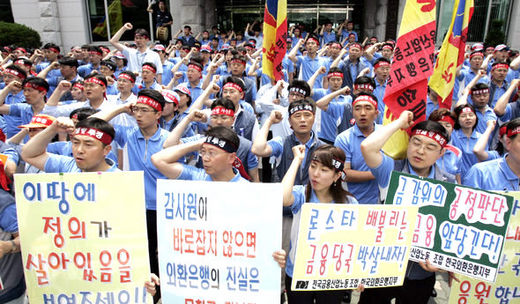 |
|
Union members of Korea Exchange Bank hold a rally on June 19 in front of the Board of Audit and Inspection (BAI) building to protest what they call an illegal sale of the bank to Lone Star. Kim Chung-hyo
|
Investigation wraps up on sale of Korea Exchange Bank to Texas fund
Ahead of yesterday’s announcement by the Board of Audit and Inspection (BAI), which had been looking into allegations surrounding the sale of Korea Exchange Bank, attention was focused on possible wrongdoing by Lone Star Funds, the bank’s buyer. While it is important to find illegal actions by former bank executives and government officials, if BAI had found any wrongdoing by Lone Star regarding the 2003 purchase, it would have dealt a severe blow to the ongoing sale of Korea Exchange Bank to Kookmin Bank. As it turns out, so far the fears of a ripple effect have been unfounded: the BAI found no impropriety in the deal, even though Lone Star bought a majority stake in the bank through a series of behind-the-scenes negotiations with bank executives and government officials. However, the BAI left the door open to possible investigation by the prosecutor’s office, saying that the prosecution could nullify the purchase if they found any wrongdoing of Lone Star in their separate investigation. For many, the BAI’s June 19 conclusion failed to present enough answers to questions regarding Lone Star’s responsibility and the subsequent resale of Korea Exchange Bank. The ball is now, for those in the financial world and observers of the case, in the prosecutors’ court.The BAI sent its investigation materials on some 20 defendants to prosecutors. According to the documents, the Financial Supervisory Service was found to have given "exceptional approval" of Lone Star’s qualification to be a major shareholder of Korea Exchange Bank. If true, it was an action done with no legal grounds. According to the investigatory records, on July 15, 2003, Lone Star asked Lee Dal-yong, then vice president of Korea Exchange Bank, to arrange the confirmation. Following that, Lone Star received the oral approval from the Financial Supervisory Service’s policy bureau, after the financial regulatory body held an unofficial meeting with one executive member and two non-executive members of the standing committee. Prosecutors should look thoroughly for any impropriety committed by Lone Star during this seemingly unorthodox process. In addition, prosecutors must determine whether any illicit deal was involved when Lee Kang-won, then chief executive officer of Korea Exchange Bank, and Lee Dal-yong, received 2.6 billion won (2.7 million USD) in total from Lone Star. The money was paid in the name of bonuses and management advisory fees, but the BAI said such payments violated the bank’s internal codes. Attention is focused on whether prosecutors will find the money was paid in return for favors. Prosecutors have also stepped up their investigation of Lee Heon-jai, a former finance minister, in connection with the Lone Star case. Lone Star is also paying keen attention to the prosecution’s probe. Kookmin Bank, which is in the process of buying Korea Exchange Bank from Lone Star, remained cautious, saying that "at present, there is no reason to nullify the sale contract, and we are not in a position to comment because we are waiting for the government’s approval.” Financial experts predict Kookmin Bank’s purchase of Korea Exchange Bank will take at least four to five months due to a number of regulatory hurdles, including a separate antitrust decision by the Fair Trade Commission against Kookmin Bank.





